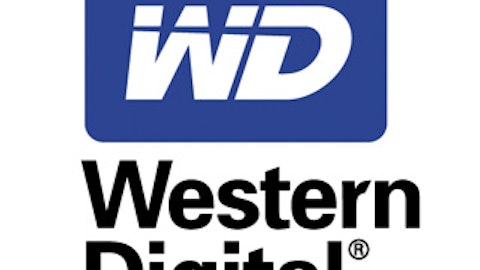In this article, we look at the 7 Best Data Storage Stocks To Buy Now.
The Future of Data Storage
Data storage refers to the systematic process of archiving digital information, ensuring its availability and security for future use. This process involves various storage methods, including direct attached storage, storage area networks, network attached storage, and software-defined storage, to maintain data in multiple formats such as text, images, and videos. Storage technologies range from traditional physical devices, like hard drives, to cloud-based solutions that offer scalability and accessibility from anywhere with an internet connection.
According to a report by Fortune Business Insights, the global data storage market was valued at $218.33 billion in 2024 and is expected to grow to $774.00 billion by 2032, with a CAGR of 17.1% during the forecast period. North America is the largest data storage market and contributed $78.98 billion to the market in 2023. A key factor contributing to market growth in the region is the increasing number of data centers. The COVID-19 pandemic has intensified the demand for storage and processing power as businesses strive to remain agile and responsive. At the same time, data centers are increasingly relying on cloud providers for their storage and processing needs, further boosting market growth in the region.
Generative AI has also played a key role in the growth of the data storage market, bringing transformative changes to data creation, processing, and storage needs. Advanced machine learning models, like GPT-3, can produce vast amounts of diverse and complex data. This increase in data generation has necessitated a reevaluation of storage architectures to accommodate the heightened volume, variety, and speed of the content being generated. Industries including entertainment, e-commerce, finance, healthcare, and manufacturing are all contributing to this surge in data production.
In a CNBC interview on May 30, Charlie Giancarlo, CEO of Pure Storage, talked about the current trends and challenges in the data storage industry and particularly focused on how artificial intelligence (AI) is influencing storage demand. Giancarlo highlighted three key areas where AI impacts storage: the need for storage to train AI models, using AI models on existing data, and upgrading existing data environments to be AI-ready. He emphasized that while AI investments may pressure other parts of tech budgets, data storage will remain a critical area that will likely continue to see investment.
According to IDC, the global storage needs were estimated at 33 billion terabytes in 2018 and this number is projected to reach 175 billion terabytes by 2025. The growing demand for data storage has led to the development of innovative, secure, and cost-effective solutions. Cloud storage has become a central element in modern data management. The adoption of big data and IoT is expected to further drive cloud storage growth. SSD technology, enhanced by data reduction techniques such as compression and deduplication helps maximize storage efficiency, making it ideal for large-scale data management. Manufacturers are introducing 3D NAND technology in storage devices. NAND is a type of non-volatile storage technology that does not require power. 3D NAND technology stacks cells vertically which allows greater capacity and reliability. While the technology offers significant benefits, such as increased storage density and reduced interference, it also comes with higher manufacturing costs.
Other emerging technologies like DNA data storage and object storage are also increasing capacity and reliability. DNA storage technology uses synthesized strands of DNA to encode and decode binary data and store up to 215,000 terabytes of data. Although still in development, DNA storage could become a viable option for critical data preservation in the future. Object storage offers a scalable and cost-effective solution for managing unstructured data by storing data as individual objects. This technology allows for quick retrieval and seamless data sharing across multiple platforms. As big data and IoT continue to grow, object storage will become increasingly essential for businesses needing to manage large volumes of data efficiently. Manufacturing companies are also implementing data security using encryption, blockchain, and AI, which safeguard data and automate threat detection.
As the digital landscape expands, innovative solutions like cloud storage, SSD optimizations, enhanced data security, AI-driven management, DNA storage, and 3D NAND will play crucial roles in meeting the growing demand for data storage solutions. With that in context, let’s take a look at the 7 best data storage stocks to buy now.

A data center filled with the latest servers and networking equipment representing the company’s cutting edge security infrastructure.
Our Methodology
We used cloud computing and data storage ETFs plus online rankings to compile an initial list of the best data storage stocks to buy now. We narrowed our list to the 7 stocks that analysts see the most upside to. The list is sorted in ascending order of analysts’ average upside potential, as of August 12. Note: We only included companies whose primary business is in the data storage industry.
At Insider Monkey we are obsessed with the stocks that hedge funds pile into. The reason is simple: our research has shown that we can outperform the market by imitating the top stock picks of the best hedge funds. Our quarterly newsletter’s strategy selects 14 small-cap and large-cap stocks every quarter and has returned 275% since May 2014, beating its benchmark by 150 percentage points (see more details here).
7 Best Data Storage Stocks To Buy Now
7. Box (NYSE:BOX)
Upside Potential: 7.85%
Average Analyst Price Estimate: $29.67
Box (NYSE:BOX) is a central platform and cloud content management tool that is used for cloud storage, file sharing, syncing, e-signatures, and collaboration among organizations to manage, share, and transfer digital content securely. Box (NYSE:BOX) has over 100,000 clients and almost 68% of them are Fortune 500 companies. The company is well-positioned to leverage its expanding product portfolio and strong market position to drive significant growth. Despite facing intense competition and market volatility, Box (NYSE:BOX) is one of the best data storage stocks to buy for the long-term.
As Box (NYSE:BOX) introduces multiple products, integrates new AI models, expands its AI capabilities for enterprise-level customization, and utilizes it for multi-document analysis, the adoption of its software is likely to accelerate further. On June 27, Box (NYSE:BOX) announced enhancements to Box AI, which is expected to significantly boost the adoption of its Enterprise Plus platform. Additionally, management is focusing on achieving FedRAMP compliance to enhance integration with external security vendors, which will increase consumer confidence in its products. Box Sign is another product by the company that allows users to request and apply electronic signatures online. Both products help the company in cross-selling its products and over two-thirds of new subscriptions come from cross-selling. The company’s emphasis on security and advanced capabilities sets it apart from competitors such as Dropbox (NASDAQ:DBX).
For the three months ended on April 30, Box (NYSE:BOX) reported that its revenue grew 5% year-over-year to $264.7 million, surpassing Wall Street’s expectations. Constant-currency growth rates were even stronger at 8% year-over-year. The company’s performance is strengthened by its Suite offerings, which now constitute 56% of total revenue. The company has also improved its operating margin by 1% compared to the previous year. Box (NYSE:BOX) is expected to grow its earnings by 7.26% this year. Industry analysts have a consensus on the stock’s Buy rating, setting an average share price target at $29.67, which represents a 7.85% upside potential from its current level.
6. Equinix (NASDAQ:EQIX)
Upside Potential: 10.81%
Average Analyst Price Estimate: $907.36
Equinix (NASDAQ:EQIX) is the largest pure-play data center REIT in the United States. The company serves over 10,000 companies and helps them securely interconnect with their partners, customers, and employees. Equinix (NASDAQ:EQIX) owns and operates a network of 260 data storage centers in over 33 countries on six continents around the world. With a market share of 40-50% among key cloud providers, Equinix (NASDAQ:EQIX) has established itself as a dominant player in the data storage sector. This strong market position is likely to drive continued revenue growth, particularly as global data storage needs expand.
By operating in multiple regions, Equinix (NASDAQ:EQIX) ensures proximity to end-users, which enhances data access speeds and meets local regulatory requirements. This proximity is vital for cloud providers and enterprises that need reliable, fast, and compliant data storage solutions. Instead of acquiring or building new facilities Equinix (NASDAQ:EQIX) has employed a blend of leased properties and joint ventures (JVs) under its ‘Xscale’ initiative, which allows Equinix (NASDAQ:EQIX) to rapidly expand its global footprint without investing a lot of capital and ensures long-term sustainability and growth.
Equinix (NASDAQ:EQIX) has a net debt leverage ratio of 3.6x and a weighted average debt maturity of 7.3 years. Additionally, 96% of its debt is fixed-rate which insulates the company from interest rate volatility. Equinix (NASDAQ:EQIX) has demonstrated remarkable stability in its financial performance with 85 consecutive quarters of top-line growth and consistent profitability on both EBITDA and AFFO (Adjusted Funds From Operations) metrics.
Equinix (NASDAQ:EQIX) is strategically positioned to capitalize on the growing global demand for data storage. Its strong market position, consistent growth, and superior scale make it a compelling investment. The stock is trading at $818.88 as of August 12. Industry analysts have a consensus on the stock’s Buy rating, setting an average share price target at $907.36, which represents a 10.81% upside potential from its current level.





